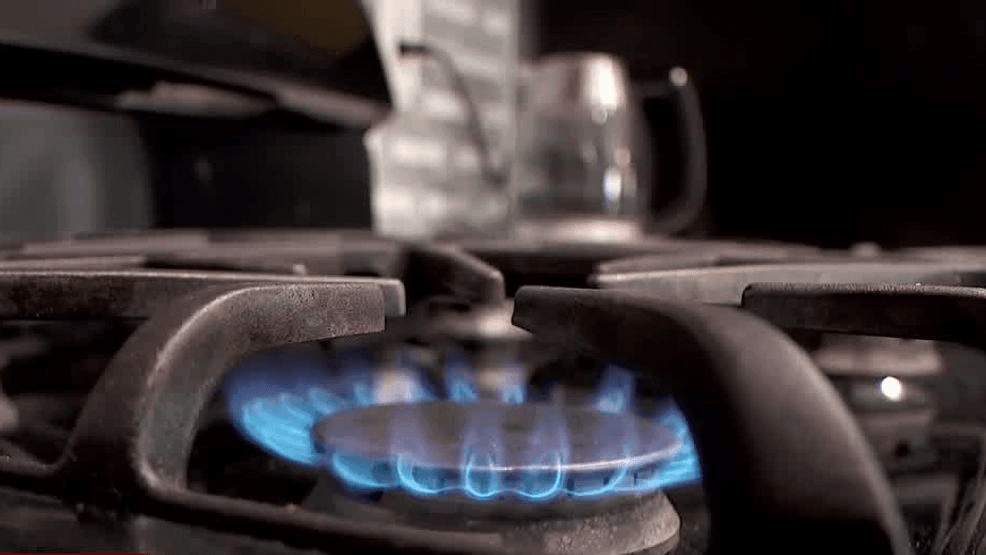SPANISH FORK, Utah (KUTV) — After a major gas leak from one woman’s stovetop and furnace in Lehi prompted the evacuation of many of her neighbors, concerns have been raised: just how should people keep themselves safe with gas appliances, like a gas stovetop that can easily be bumped? KUTV 2News Natalie Wadas spoke with area fire departments about this, and heard from one man who invented a device to curb these worries after his time as a Utah firefighter.
The Spanish Fork Fire and EMS Chief Eddie Hales said calls for gas leaks are really common; and while they have the potential to be disastrous, there are some ways you can protect yourself.
“I love gas burners. We prefer them, they cook better, and you can make homemade smores, but also I’m definitely with little kids worried about leaving it on,” said Wendy Santiano, who was one of the people that had to evacuate Thursday morning in Lehi due to her neighbor’s gas leak. The experience has left her with newfound concerns about her own gas stovetop’s seeming lack of safety mechanisms: “Like with a smoke alarm, if the battery’s running low you have a sensor.”
MORE | Natural Gas Explosions:
Hales said they take natural gas leaks very seriously. “Yeah, so we go on probably two to three a week as far as natural gas carbon monoxide type instances,” Hales said, “it’s an explosive gas. So, anytime an explosive gas gets built up, it only takes a small amount of friction or a spark to ignite that into an explosion.”
He said maintaining gas appliances well, making sure they are clear of debris and well-ventilated is important. Also: “We always encourage people to have carbon monoxide detectors; they also make dual type of detectors that sense explosive gases as well.”
However, Santiano wonders if this is enough, given how dangerous natural gas leaks can be. “I just feel like there could be like a beep or something that says hey, you know, it’s on or has an automatic shut off and then you can reset it,” Santiano said.
“So, here’s a gas solenoid that goes on the back of your stove there, and a red box here that’s the brains of it,” said Peter Thorpe, CEO of FireAvert. Thorpe was a firefighter in Provo for 16 years. After many kitchen fire and gas leak calls, he decided to invent an automatic shut-off system right here in Utah. The device, called FireAvert, works when a smoke or gas detector goes off. “The red box here hears that sound and automatically the solenoid shuts off gas flow preventing gas leak to the apartment to your home, preventing maybe like an explosion,” Thorpe said.
Chief Hales said when in doubt about whether you have a gas leak or not, call emergency services. “We would rather go to a false alarm than to have a real incident to where something bad is happening to those in our communities.”
Lehi City Emergency Management sent 2News a list of tips on what to do if you suspect a gas leak. They are as follows:
1. Be Aware of the Signs of a Gas Leak
Smell: Natural gas is odorless, but a chemical (mercaptan) gives it a rotten egg smell.Sound: Listen for hissing or whistling near gas lines or appliances.Sight: Watch for bubbling in water, discolored vegetation, or dust blowing from a hole in the ground.
2. Install and Maintain Gas Detectors
Natural gas and carbon monoxide (CO) detectors can alert you to leaks.Test alarms monthly and replace batteries regularly.Place detectors near gas appliances and sleeping areas.
3. Regularly Inspect Gas Appliances
Schedule annual professional inspections for:Gas stovesWater heatersFurnacesFireplacesCheck for damaged or corroded connectors and shutoff valves.
4. Know How to Shut Off the Gas
Locate your main gas shutoff valve (usually near your gas meter).Learn how to turn it off using a wrench.Only shut it off if you suspect a leak and know it’s safe to do so.
5. Keep Vents and Appliances Clear
Ensure vents, flues, and chimneys are clean and unobstructed.Never block airflow around gas appliances.
6. Avoid DIY Gas Work
Never attempt to repair or install gas lines or appliances unless you’re a licensed professional.Use only certified technicians for installations or repairs.
7. Know What to Do if You Suspect a Leak
Do not use electrical switches, phones, or anything that could cause a spark.Evacuate the area immediately.Call 911 or your gas company from a safe location.Do not re-enter until authorities declare it safe.
8. Keep Emergency Numbers Handy
Post the gas company’s emergency line and 911 near every phone in your house.
_____
